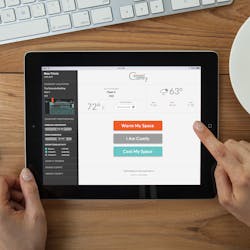Indoor Comfort: I Voted Today
If you’re feeling uncomfortable in terms of the climate control in your own home, you could open a window, pull down the blinds or bump up the thermostat. Yet, long hours spent in an office leave many individuals helpless to control their own comfort. The democratization of the workplace is slowly breaking down the barrier to personal comfort in commercial buildings, so before you don a Snuggie or sunglasses, check out these Comfy and +Comfy systems that promise comfortable and content offce workers. +Comfy aims to boost office productivity by promoting occupants’ access to building control technologies already in place in many commercial office buildings.
Here’s how it works: a simple Internet interface allows building users to vote on their comfort levels in the space. Users vote either “Warm my space” or “Cool my space” and based on the aggregated data in a zone, the environment responds to the results. Too hot? The temperature goes down or breezes increase. Too cold? The climate gets slightly warmer.
There’s certainly more to comfort than temperature; one aspect of an office ecosystem that has never been addressed by a thermostat is light and glare, reminds Brandon Tinianov, vice president of business development for View Glass. “Comfort is a complicated thing that cannot be solved with a puff of cold air,” says Tinianov. “It’s a set of priorities involving glass, air, heat and air speed.” As a true barometer of personal comfort, the +Comfy system will now address visual comfort by activating View Dynamic Glass or deploying window shades when occupants report that it’s too bright, or there’s glare on their screens. Using +Comfy to control View Glass increases the effectiveness of the technology and increases end-user satisfaction with its product. “We’re designing it around what the population wants and what’s best for the building,” says Tinianov.
Companies such as Commscope, Intel, Redwood Systems and Lutron have also joined as third-party collaborators with +Comfy-software creators, Building Robotics, to make intelligent offices possible.
Sustainable design firm GLUMAC implemented a +Comfy system at its L.A. office and confirms its effectiveness. According to mechanical designer Kameron Beeks, their findings have shown that with Comfy, the temperature range of occupants’ comfort zones broaden significantly—proof that personal control is a cost-effective way to ensure comfort while lowering energy consumption.
+Comfy was unveiled recently at The Verge, a conference that aims to mesh technology and the built environment.
